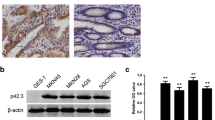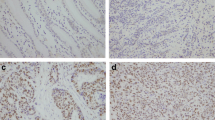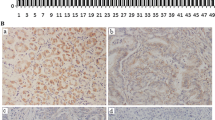Abstract
The early growth response (EGR) family has a highly conserved DNA-binding domain and encodes zinc finger proteins, which show suppressive effects on tumour growth. However, the expression and significance of EGR3 in gastric cancer are still unknown. In this study, real-time PCR, immunohistochemistry and western blot assays were performed to detect the expression of EGR3 in gastric cancer tissues and matched non-tumour tissues and to further analyse the EGR3 expression associated with clinical pathological factors, including prognosis. Our results showed that EGR3 expression was significantly lower in gastric cancer tissues compared with matched non-tumour tissues and that patients with lower EGR3 expression had a poorer prognosis compared with patients with higher EGR3 expression. Our results suggest that decreased EGR3 expression might play a critical role in the differentiation, proliferation, metastasis and progression of gastric cancer cells and may also be a potential diagnostic marker for gastric cancer.



Similar content being viewed by others
References
Alberts SR, Cervantes A, van de Velde CJ (2003) Gastric cancer: epidemiology, pathology and treatment. Ann Oncol. 14(Suppl 2): ii31–ii36
Bickmore WA et al (1992) Modulation of DNA binding specificity by alternative splicing of the Wilms tumor wt1 gene transcript. Science 257(5067):235–237
Catania MV et al (1999) An enhanced expression of the immediate early gene, Egr-1, is associated with neuronal apoptosis in culture. Neuroscience 91(4):1529–1538
Chang AT et al (2011) Adjuvant chemoradiation for resected gastric cancer: a 10-year experience. Gastric Cancer 14(1):63–71
Fan D et al (2005) Bird’s-eye view on gastric cancer research of the past 25 years. J Gastroenterol Hepatol 20(3):360–365
Gallitano-Mendel A et al (2007) The immediate early gene early growth response gene 3 mediates adaptation to stress and novelty. Neuroscience 148(3):633–643
Huang RP et al (1994) Suppression of v-sis-dependent transformation by the transcription factor, Egr-1. Oncogene 9(5):1367–1377
Huang RP et al (1995) Egr-1 negatively regulates human tumor cell growth via the DNA-binding domain. Cancer Res 55(21):5054–5062
Huang RP et al (1997) Decreased Egr-1 expression in human, mouse and rat mammary cells and tissues correlates with tumor formation. Int J Cancer 72(1):102–109
Jemal A et al (2011) Global cancer statistics. CA Cancer J Clin 61(2):69–90
Ji MY et al (2012) The detection of EBP50 expression using quantum dot immunohistochemistry in pancreatic cancer tissue and down-regulated EBP50 effect on PC-2 cells. J Mol Histol 43(5):517–526
Johnson AH et al (2005) Expression of tight-junction protein claudin-7 is an early event in gastric tumorigenesis. Am J Pathol 167(2):577–584
Kang W et al (2011) Yes-associated protein 1 exhibits oncogenic property in gastric cancer and its nuclear accumulation associates with poor prognosis. Clin Cancer Res 17(8):2130–2139
Lee SL et al (1996) Luteinizing hormone deficiency and female infertility in mice lacking the transcription factor NGFI-A (Egr-1). Science 273(5279):1219–1221
Liang S et al (2011) MicroRNA let-7f inhibits tumor invasion and metastasis by targeting MYH9 in human gastric cancer. PLoS ONE 6(4):e18409
Liu C et al (1998) Suppression of growth and transformation and induction of apoptosis by EGR-1. Cancer Gene Ther 5(1):3–28
Lu J et al (2012) Analysis on the clinical and pathological features and prognosis of familial gastric cancer in South china population: a single-center study of 724 patients. J Oncol 2012:641218
Miettinen S, Ylikomi T (2009) Concomitant exposure of ovarian cancer cells to docetaxel, CPT-11 or SN-38 and adenovirus-mediated p53 gene therapy. Anticancer Drugs 20(7):589–600
Padua D et al (2008) TGFbeta primes breast tumors for lung metastasis seeding through angiopoietin-like 4. Cell 133(1):66–77
Patwardhan S et al (1991) EGR3, a novel member of the Egr family of genes encoding immediate-early transcription factors. Oncogene 6(6):917–928
Sela U et al (2008) A peptide that ameliorates lupus up-regulates the diminished expression of early growth response factors 2 and 3. J Immunol 180(3):1584–1591
Suehiro J et al (2010) Vascular endothelial growth factor activation of endothelial cells is mediated by early growth response-3. Blood 115(12):2520–2532
Tang S et al (2010) Overexpression of a novel gene gankyrin correlates with the malignant phenotype of colorectal cancer. Cancer Biol Ther 9(2):88–95
Tourtellotte WG et al (2001) The transcription factor Egr3 modulates sensory axon-myotube interactions during muscle spindle morphogenesis. Dev Biol 232(2):388–399
Wang H et al (2012) A feasibility study on gene therapy of pancreatic carcinoma with Ad-PUMA. Cancer Biol Ther 13(9):712–719
Yan SF et al (2000) Egr-1, a master switch coordinating upregulation of divergent gene families underlying ischemic stress. Nat Med 6(12):1355–1361
Zandarashvili L et al (2012) Asymmetrical roles of zinc fingers in dynamic DNA-scanning process by the inducible transcription factor Egr-1. Proc Natl Acad Sci USA 109(26):E1724–E1732
Acknowledgments
This work was supported by the Fundamental Research Funds from the Central Universities (No. 20103020101000194). We thank Mr. Hong Xia for providing technical assistance.
Conflict of interest
The authors declare that they have no competing interests.
Author information
Authors and Affiliations
Corresponding author
Additional information
Fei Liao and Meng-Yao Ji equally contributed to this work.
Rights and permissions
About this article
Cite this article
Liao, F., Ji, MY., Shen, L. et al. Decreased EGR3 expression is related to poor prognosis in patients with gastric cancer. J Mol Hist 44, 463–468 (2013). https://doi.org/10.1007/s10735-013-9493-8
Received:
Accepted:
Published:
Issue Date:
DOI: https://doi.org/10.1007/s10735-013-9493-8




